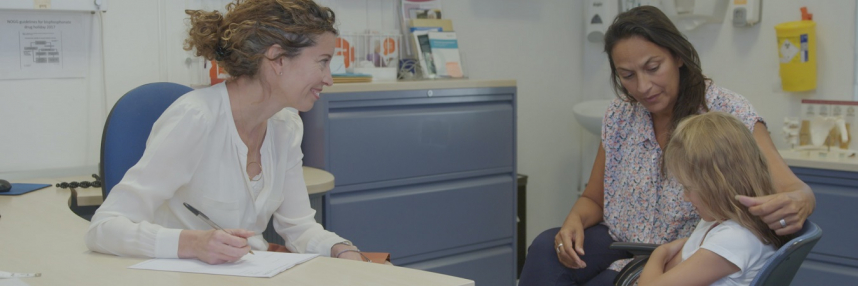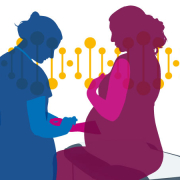New journal article and films highlight progress in genomics
The power and pitfalls of applying genomics in clinical genetics today are explored in a newly published piece in Clinical Medicine journal
Professor Katrina Tatton-Brown and Dr Katherine Josephs of St George’s University Hospitals NHS Foundation Trust have this week released an article in the Royal College of Physicians’ Clinical Medicine journal. The article explores the use of genomic medicine in healthcare today and features five case studies and accompanying films funded and co-produced by the Genomics Education Programme.
The rapid expansion of genomics
Powerful new technologies are transforming healthcare and increasingly genomic data is informing patient management across all healthcare specialties. Despite these exciting advances, however, few clinicians are aware of or prepared to use genomics.
The idea for this article and films was to showcase some of the incredible progress being made in the area of genomics and to demonstrate the value of clinical genetics, whilst also covering some of the challenges of dealing with a deluge of genomic data and making the right decisions for patients.
The project was first discussed at a meeting of the Joint Committee on Genomics in Medicine, chaired by Dr Helen Firth, which is attended by the Genomics Education Programme’s scientific director Dr Anneke Seller and Professor Tatton-Brown (on behalf of the Royal College of Physicians).
Five interviews with patients and clinicians
The power and potential pitfalls of using genomics in healthcare are explored through five patient-based scenarios: three interviews with clinicians and two interviews with patients.
The power of a genetic diagnosis
Beskida Fejzullahu tells the story of her son, Arvin, and the family’s search for a diagnosis for his rare disease. A rapid exome sequencing test during Beskida’s second pregnancy confirmed that her second child would not be affected with the same condition, and this was only possible thanks to advanced next-generation sequencing technology. Beskida explains the importance of both a diagnosis for Arvin and the prenatal testing she was offered.
Access to gene-directed therapies
In this film we meet Iain Emmerson, who has Tubular sclerosis complex, a condition which outwardly affects the skin and pigmentation but internally sees growths form on the main organs. Recently Iain was invited to participate in the pilot programme of a new gene-directed therapy that aims to inhibit tumour growth and extend his life. In this film, he talks about the benefits of being offered this ‘lifeline’.
Genomic variants: innocent until proven guilty
Dr Richard Scott discusses the complicated process of classifying genomic variants. Using an example from his clinical practice, he explains how easy it can be to make the wrong call – in this case a false positive diagnosis – and the importance of expertise and exercising caution when trying to find the cause of a patient’s rare disease.
The realisation of personalised medicine
The use of genomic technology is driving progress in cancer treatment and management. In this film Dr Alison Berner talks about the use of genomic sequencing technology to identify mutational signatures, allowing us to better understand the progression of cancer and opening up the possibility of new treatment targets and management options.
Interpreting results: beware the amplification of error
Dr Angela George discusses the complexity of dealing with variants of uncertain significance and the possible implications of incorrectly classifying variants. She emphasises the importance of exercising caution and assessing the evidence before classifying variants as pathogenic (disease causing).
You can read the published article here, and view the films on our Vimeo channel, alongside many other films exploring genomics in healthcare. A wide range of educational resources, including free online courses and clinical tools can be found here.









